#but I don’t think becoming a faceless man is a moral fault of hers she just genuinely doesn’t know what else to do
Text
I’ve seen a post recently that dismisses Lyanna’s age as GRRM being bad with picking the ages of women, basically saying nooooo it’s fine she was 15/16 and Rhaegar was in his early 20s it’s just George not thinking it through enough but I really disagree. George wrote “It was her fourteenth nameday” on purpose he knew what he was doing with that I think we are supposed to be critical of Rhaegar and Lyanna. Rhaegar is boring if you’re not critical of him. Most characters are boring if you’re not critical of them. I could theoretically come up with arguments defending many the actions of my favs as perfectly just but that is so boring. Like. Yes the protagonists are Always In The Right don’t you get bored of that? Isn’t that tiring? Isn’t it better to have a protagonist who makes mistakes? Some of you are like “we do acknowledge xyz character’s faults we do!! we only get mad about the unfair criticisms!!” and then I never see any discussion of said faults. I get that people can have a knee jerk reaction because some criticism of certain characters I see IS unfair and sexist so it’s hard not to develop a knee jerk response to it but I prommy it’s more interesting to say “well what if this wasn’t a writing oversight and the character was actually in the wrong?” Because we are all in the wrong sometimes and acting like a character has never done anything wrong makes them unrelatable and boring.
Except for Samwell Tarly I think he actually never did anything wrong.
#well neither did Bran#and I find it hard to condemn Arya’s actions#I don’t think executing Daereon was necessary#but I don’t think becoming a faceless man is a moral fault of hers she just genuinely doesn’t know what else to do#but her inner conflict is still compelling to me#whereas I have trouble connecting to characters like Bran for the very reason that he hasn’t done anything wrong#his plot line is interesting but his character doesn’t really compel me#and to be fair neither does Sam#I feel quite endeared to him but I couldn’t write long metas about him#like he’s good and wholesome and makes my heart happy#you could say yes he committed voter fraud but I think that was too slay to condemn
3 notes
·
View notes
Text
Scummy Heroes are to Blame
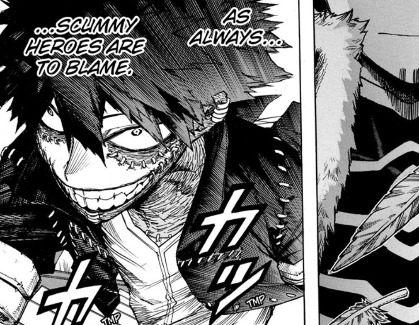
My Hero Academia has always been about this idea. In a literal society of heroes, there are people who do not get saed. Even though the literal job of heroes is to save people, heroes have become not much more than a militant branch of the police force in hero society under the thumb of the hero commission.
This conflict comes to a head in Dabi, Twice, and Hawks who are all three of them people who weren’t saved by heroes.
1. A Society Where Heroes Don’t Save People
Most of the heroic characters on their side of the story have a very vague idea of what a hero is, almost like that’s thematic or something. There seems to be two types, heroes who save people, and heroes who defeat villains, with the latter being the more popular one. However, there have been a couple of moments that idealize what a hero should be.
Both Mirio and Deku say that a hero should always act to save a crying little girl in front of them.


Twice says that someone who helps their friends can’t possibly be a bad guy. These are simple heroic ideals that we see Hawks a heroic character completely fail to live up to in the coming chapters.
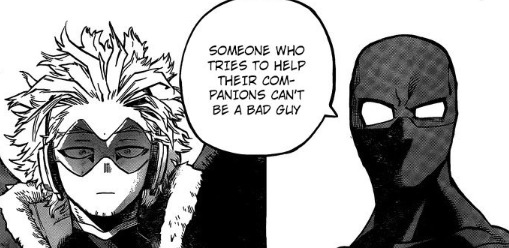
Twice is hardly acting like a villain in this scenario. He’s acting nothing like the threat to hero society that Hawks imagined him to be with his great ability to create almost an entire army of duplicates with his quirk. He is crying, and begging for help, like a person would.
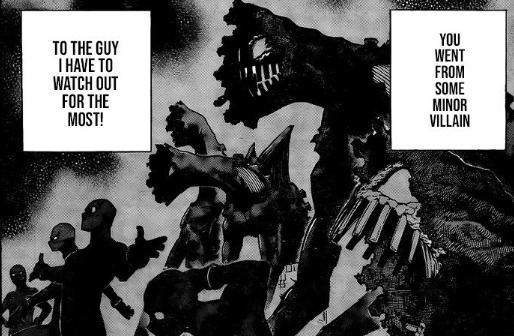
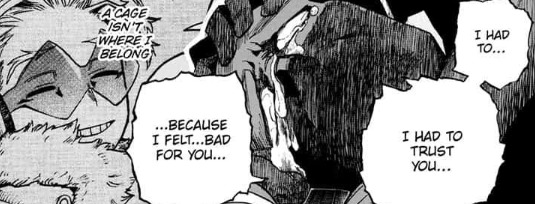
Hawks is faced with a person crying because someone they trusted, and wanted to be friends with and treated like a person betrayed them, and used them as a tool to complete their bojective all along. Hawks is faced with not a villain, but a victim.
Hawks is, slaughtering copies of the true companions that Twice does everything for. Attacking a person who is helpless and crying out in frustration. Coldly deciding to kill someone who says out loud that the only reason they want to fight is for the happiness of their friends.

In a traidtional sense Twice is the one fighting with Nakama power, and Hawks is the character who the power of Nakama has failed to reach and is instead cutting those same friends down. Despite the fact that Twice is a terrorist and a murderer, and Hawks is a hero who has wholly dedicated his life to saving others the framing of the situation has been entirely flipped. It’s Hawks who looks like the villain, and Twice who looks like the hero struggling to fight for his friends.
This is where the nuance of the series kicks in. Hero and villains are not strictly defined roles, they’re only called that because hero society dictates they are.

One of the first things that Shigaraki says in the series is that heroes using violent suppression in order to defeat villains is just something that creates more violence in the end. Something which All Might pointedly refuses to listen to, accusing Shigaraki of just being a bad person who enjoys violence. Ironically this is something Shigaraki is utterly dehumanized by and accused of over, and over, and over again.

However as we learn more of Shigaraki’s story we learn that Shigaraki was a kid with heroic ambitions, who was failed by society at every level. The reason he’s violent is because he was exposed to violence again and again as a kid, his violent impulses were literally beaten into them.

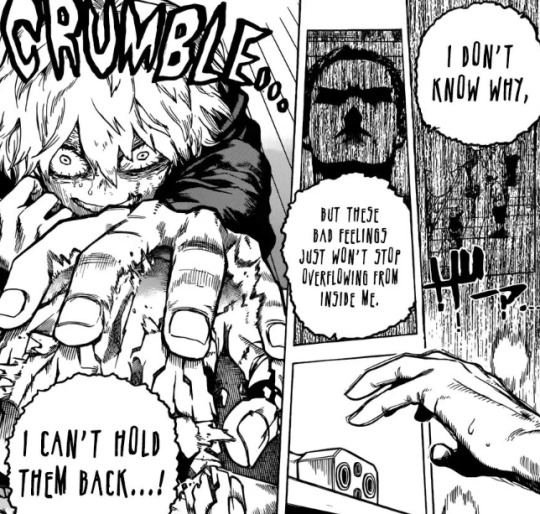
The black and white morality of hero society blames victims for falling, and then insists the reason that they fell in the first place was because they were bad people. Hero society again and again intentionally lets people fall and then villainizes them rather than sympathizing with them as victims.
If you fall its entirely on your own, and also a sign of your character. You have to get back on your feet on your own merits. If you fail to make it back into society than it’s not the fault of society, you’re just a bad person for becoming a victim in the first place.
Mirio and Deku both believe that you should always help a crying girl in pain like Eri, but at the same time if they had not saved her at that exact moment, if they had let her grow up like Shimura Tenko grew up, to develop violent tendencies, to act like anything other than the perfect crying victim then she would have been left behind the same way Shimura was, the same way Twice is at this exact moment.
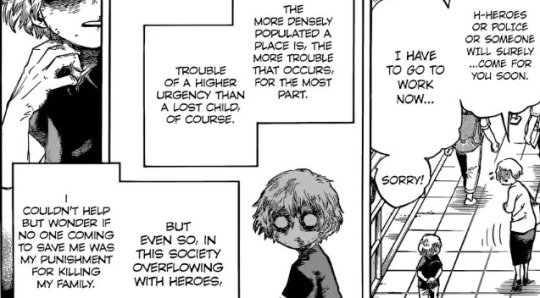
In a society overflowing with heroes, there are people who are ignored and do not get saved. Shimura Tenko as a five year old, wonder if it’s his fault for killing his family that no one came to save him. Already by that time he’s internalized the idea that a bad child like him doesn’t deserve to get saved.
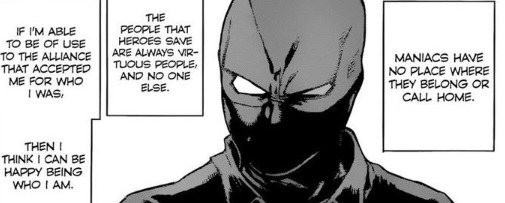
Twice even says the same as well. In hero society only the good and the virtuous get saved. People like twice who are broken are left behind and forgotten, because it’s more convenient for society to function that way.
I relate this idea to Albert Camus, the fall. A book that explores the idea of who is guilty for society, and comes to the conclusion that everyone is guilty.
The Fall operates on the premise that all are guilty. This is indeed a classic argument for Camus, but the narrator of this novel goes so far as to suggest that all men are murderers, even if only by accident or through negligence (like not saving others from death). Since the novel was written in the aftermath of WWII, this is a particularly poignant argument. This sort of "universal guilt" makes any attempt at judgment completely hypocritical. A guilty man condemning another man of guilt is absurd by nature.
Everyone who participates in society creates it actively. I’ll explore this idea with Hawks more in a minute, but related to who is responsible for hero society it’s important to look at the conflict of heroes and villains. The heroes themselves blame the villains for all the ills of hero society. However, it’s important to remember who holds all the power. Sure, there are outliers like Re-Destro who are corporate millionaires with a vast infleunce, but for the most part all of the ruling power in society belongs to the heroes. While the villains are for the most part, homeless people, outlaws, with little resources or influence of society as a whole. Villains are outcasted and blamed for society, despite being you know... outcasts, people outside of society.
Which is why Villains themselves will always be nothing more than a symptom. Even the League of Villains themselves is just a rebellion. They’re not rebelling for the hell of it, they were created in direct response to problems already presence in society, and they demand that society address those problems. The ones who hold the real power over a corrupt system are heroes, villains are always going to be reactionary to that corrupt system. Sure, the answer might not be ‘destroy the entirety of society to make it better’, but the League are also the only people trying to do anything. Only the outsiders and the outcasts seem to be aware that something is wrong in the first place, because they’re the most directly affected by it.
So, like Camus we are asked to consider who is really responsible for the fall of society?
2. Twice and Hawks, to be an individual or member of society.
Which is why the way Hawks acts the past two chapters is so unheroic, even in accordance of the very loose ideas of what the story set up as what a hero is. Hawks isn’t trying to save Twice. He’s trying to save himself, his own cosncience, because he thinks it’s wrong to kill a “good person” like Twice. He’s acting to save Twice with no regards of what Twice’s wants and needs are.
Rather than try to understand and sympathize with Twice, Hawks approaches him using his entire identity as a hero as a wall between them. He acts in the role of a hero, I am going to capture you the villain and put you in jail. Hawks makes this impersonal as possible and sinks into the role of being a hero, while Twice is still acting as Twice the person.

However, Hawks only cares about saving Twice. Because Twice is the one he dubs as a good person and therefore worthy of being saved. He doesn’t care enough to empathize with the rest of the league, even though Twice cares more about his friends than his life.
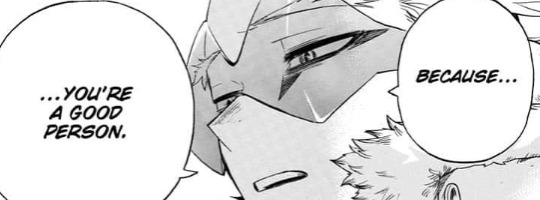
Which is what Twice explicitly calls out. That Hawks is not acting like a hero in this situation. He’s not acting selflessly. He’s not trying to save anyone. He’s only acting in ways that satisfy himself. Hawks is acting to reinforce his incorrect world view, that he has to be the one who makes sacrifices for the sake of a faceless majority, even if that person they’re sacrificing is crying and begging in front of them.

Twice brings up the idea that Toga despite being a killer out for blood is also a person who was incredibly kind to him in a moment of weakness. Which is something we the reader know, that all of the members of the league of villains, violent as they are are still people, who are capable of both good an bad. Most of the league members didn’t even fall becausethey were bad, but because of abusive circumstances, parental abuse for Toga, Shigaraki, failure of the social safety net in Twice’s case, victim of societal prejudgice in Spinner’s case.

What Twice suggests is that all of these people that hero society leaves behind are still capable of good, capable of selflessness. Shigaraki is again and again called one of the most violent characters in the series who only cares about destroying for its own sake, and yet he’s the one who gave Twice a home.

The league faces this accusation constant times. That the reason they do crime is because they’re bad people, that they don’t think about how other people feel at all, that’s the only explanation for why they would strike out against society.

And time and time again we’re shown the opposite is the case. Dabi thinks about the heroes he’s killed so much he feels himself slowly going insane. Shigaraki feels such intense remorse for killing his family in what was a total accident, that not only does he take all the blame on himself for years, but he also purposefully triggers himself with their dead hands so he’ll never escape from the guilt of killing them. These are all people fully aware of the bad they are committing underneath their actions, but also who believe otherwise that they have no choice but to do these bad things.
The league of villains has to rebel, because the response of hero society to all of their damage has always been the same thing. Exactly what Hawks does this chapter.
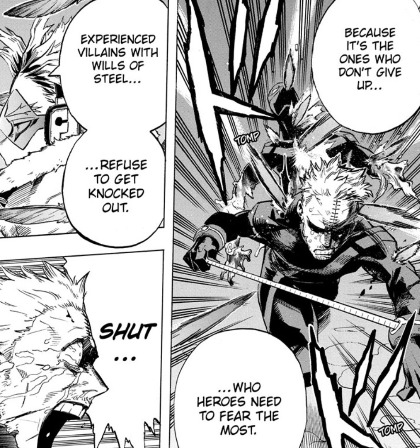
Shut up and take it. Hawks is telling Twice to lie down and stop fighting against him because 1) he doesn’t want to kill Twice and it would be easier on his conscience, and 2) this is what Hawks has always done.
Hawks always chooses to sacrifice himself. He always chooses the good of society over what he personally wants. He’ll always choose the worst option for himself if it means he can do better for others. Hawks in the face of Twice’s individualist rebellion can’t really handle it, because Hawks has never fought back against his own shackles of society.

His plan has always been if he does everything the hero commission tells him to do then... that will somehow help him achieve his society where heroes have more freedom and agency in their lives. I’ve been over Hawks’ backstory a few times, but it makes sense for Hawks to be caught in this negative feedback loop. He’s been conditioned to fight all alone and achieve everything on his own by sacrificing himself his entire life, he’s basically had the ideals of a self sacrificing hero forced onto him. His personality has been intentionally molded to heroics, the same way that Shigaraki was molded to become a villain.
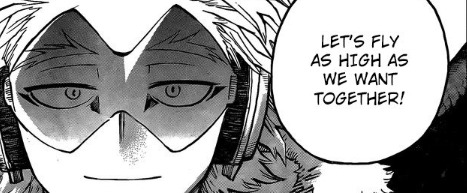
Which is why when Hawks gets someone who genuinely sympathizes with him and treats him like a person, and suggests to hawks something that he has never heard in his entire life, that he can rely on other people, that he can trust other people, that he can let other people help him Hawks genuinely does not get it.
He chooses to fall back on what his abusers have taught him, rather than to trust Twice’s genuine good will. Which is once again common abuse victim behavior, a lot of abuse victims regress and fall into bad patterns because their abuse is what they know, whereas healthy relationships and boundaries are unknown to them.
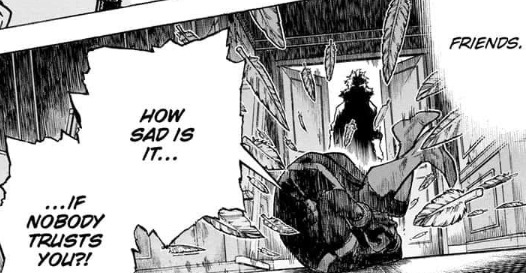
Twice even says so, that Hawks actions are pitaible here. How sad is it that hero or villain, nobody in the world trusts Hawks? He doesn’t have a friend on either side now, and he’s trying to kill the one person who sympathized with him genuinely as a person because Hawks doesn’t know what to do with that sympathy, or escape the cage he’s been trapped in his entire life.
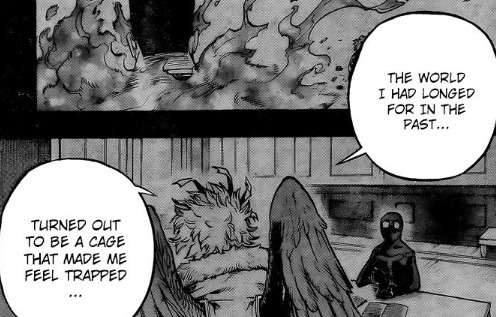
The difference between Hawks and Twice is that while they have both been wronged by society, Twice fights back with his legitimate grievance against society, whereas Hawks will never fight back. He chooses to let himself suffer if that means that the faceless majority will be spared his suffering. It seems like Hawks is making the sefless choice here, but in choosing not to fight back he’s also repeating the evils of hero society.
You can see it in his monologue to Twice. The one hero that Hawks idealizes the most, is one of the most abusive members of hero society. An abuser who did to his own children what he hero commission did to Hawks. Hawks holds up to an ideal the most toxic element of hero society, the idea that heroics is just numbers. Hawks runs his hero agency the exact same way Endeavor does, efficiency, above all else, it’s just Hawks cares more about saving people and Endeavor cares more about catching villains and resolving cases. His ideal hero is somebody impersonal like Endeavor, who puts efficiency and speed above all else. Hawks’ goal is to be the most effecitve tool possible.
In Hawks’ choice to side with hero society however, we see him passively repeating the abuse that was done to him.

Hawks encourages Endeavor of all people to train his interns hard. Because the hero commission is planning to use a bunch of fifteen year olds as their backup in case their main plan fails. Which means Hawks is actively encouraging what was done to him, (being robbed of his childhood and raised as a child soldier solely for the purpose of being a hero) to be done to the UA students as well. He doesn’t really interact well with Bakugo, someone who is also a child prodigy who has been affected all of their lives due to the fact that he had a quirk suited for being a hero.
By choosing to passively do what he’s told, Hawks ends up perpetuating Hero Society’s ills. Hawks’ offer to Twice isn’t really one that will genuinely save him (ie guaranteeing the safety of him and all of his friends if they stop violently resisting) but rather he offers Twice the chance to conform so he can fit in with society’s ideals. Just like Hawks always takes the choice to conform himself rather than try to be an individual in any way.
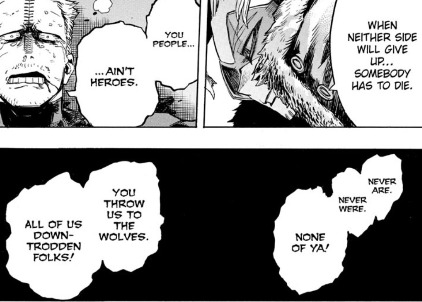
Which is why we finally get to Twice’s accusation. That Hawks isn’t acting heroic. He’s not trying to save the person in front of him that’s crying and begging for help.
Why does Dabi get the jump on Hawks? It’s because Hawks’ wings aren’t meant to be used as weapons like this. he always trained himself so that his feathers could hear even the faintest cries for help. Suddenly Twice is literally screaming for help in front of him, and Hawks ignores him. He’s no longer acting like a hero, and so therefore his wings that can hear anything are now deaf, just like Hawks is trying to be by repressing everything else but his mission.
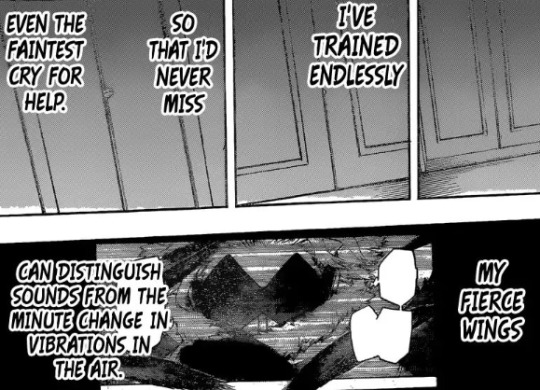
3. Dabi and Hawks
Once again there’s a point of foiling here. Twice and Hawks are both loners to their respective organizations. Dabi never tells other people what his intentions are and he acts with a begrudging sense of teamwork at best.
As much as Dabi complains that he doesn’t care about Shigaraki’s backstory, that he doesn’t want to play friends with the rest of the league, he still in the end gives his absolute all in the fight against Deka City, and fights to the point where he’s literally burning himself alive on the inside because the elague asked him to.
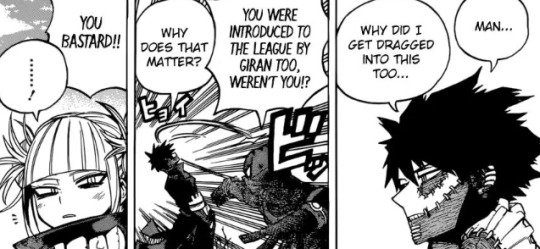
Hawks and Dabi are by nature very two faced people. They are both made up of two individuals, the person they present to the world and everyone around them, and then their real self which they choose to keep hidden.
They are also total opposites in how they present themselves. Dabi acts like he’s callous and cold on the surface. He pretends to be someone who enjoys killing, when Snatch accuses him of being behind a string of murders he basically laughs it off.

However, we’re shown in private that he’s the opposite of his public persona. Rather than someone who can laugh off what he’s done, and enjoys being a villain he thinks about what he’s done so much, with so much remorse that he feels himself going crazy. This is the opposite of how Hawks shows himself. In public Hawks is a very likable, carefree guy, who is totally dedicated to saving other people. Whereas when he reveals what is his “true self” in front of Twice, he plays the role of ruthless villain the same way that Dabi does with snatch. He even goes so far as to taunt Twice for trusting him.

The way they both present themselves is totally reversed, Hawks plays the good guy while deep down he considers himself to be the conniving bad guy. Dabi plays the bad guy while deep down he considers himself to be a very conscience heavy person who knows what he’s doing is wrong but is trying to accomplish some kind of good.
There’s a reason that Hawks’ entire face is shown in shadow in this cene. Hawks is incredibly repressed. He represses his ruthless side, in order to play not only the hero, but the helpless tool of the hero commission. The reason he’s shown in shadow is because his repressed side is coming out. All of his cold caluclation, the fact that he doesn’t trust a single person, all of these are traits that Hawks himself is unaware of but are nonetheless part of who he is as a person.
Dabi expresses what Hawks represses. Hawks has all the bad traits under the surface to appear good, Dabi wears all of his bad traits on the surface to appear bad. They really are inversions of one another, and they’re also both fixated around the ideal of heroes.
There’s a lot of debate over whether Hawks or Dabi gave the narration line “It’s the fault of us scummy heroes” it actually doesn’t matter who said it, the reason it was drawn over both of them is because it applies to both of them. Hawks and Dabi are both people who were failed by, and even manipulated by scummy heroes in their life, Dabi by Endeavor, and Hawks by the Hero Commission. When Hawks even admits that heroes were not what he thought they were, and he feels trapped and used by them to Twice the image that appears in his mind is Endeavor’s back turning away from them.
Dabi and Hawks have been wronged by heroes, and raised and molded to be heroes as child soldiers and they both keep this idealized image of a way heroes should act in their heart. However, both of them have completely opposite responses, Dabi rebels, and Hawks submits.
They have opposite reactions to their abuse, Dabi externalizing by trying to change the world around him (persecuting scummy heroes who don’t fit his stadndards) and Hawks internalizes he tries to change the world by changing himself. Dabi punishes others for not reaching the ideal of perfect hero that he holds, whereas Hawks tries to change himself and tries to become the perfect hero that is always selfless, and always chooses to save the most people possible.
Neither of these are healthy choices, and both of them are destructive. You can’t even argue that Hawks’ choices only harm himself anymore, because we see him literally choosing to murder a person that is crying and begging in front of him, because he’s convinced himself he doesn’t have any choices in this situation. Just because you don’t make a choice for yourself doesn’t mean you’ll never harm someone, in fact your refusal to act on your own will can lead you to do something you don’t want to do and being unable to stop yourself which is clearly the case for Twice and Hawks.
The one difference between Dabi and Hawks however, is the people surrounding them. Dabi is antisocial, always acts like he’s not a member of the group, and yet the people around Dabi choose to trust him anyway.

Hawks and Dabi say a lot of things about who they are, but then reveal who they are in their actions. This too, is where they are inverses of each other. Dabi constantly insults his friends, doesn’t act like he’s a part of the group, says he doesn’t trust them, but ultimately when the chips are down Dabi gives his all to fighting with the league of villains. He complains about it the whole time, but he does it. Part of the reason why Dabi ultimately sides with them is because Shigaraki does give Dabi this trust to go off and do his own thing as long as he comes back at the end of the day.
Dabi could have easily turned out to be someone just like Hawks, not interested in the goals of the League of Villains as a whole, and instead just there to use them for his own benefit. I believe his actions in the latest chapter show that he’s not. Dabi goes out of his way to save Twice, because Twice actually is a comrade to him no matter how much Dabi pretends otherwise.
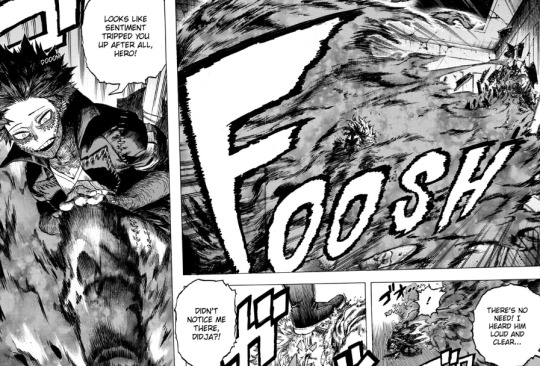
Now we don’t know if Dabi ultimately invited Hawks into the league knowing that he would betray them, or what his plans are, but ultimately his actions are the opposite of Hawks. Hawks the hero chooses to kill Twice in this scene. Dabi, the villain chooses to save Twice. Dabi is in a sense fighting for his comrades in this scene, where Hawks is fighting against the idea of camraderie and trust. He even, literally kills the symbols of all of twice’s comrades when he pulls duplicates of them. Hawks and Dabi are very similiar people, but in different environments, Dabi exists in ane environment of trust, Hawks in one where no trust exists, and because of that Dabi is able to make better choices in the moment.
We see Hawks’ visor shatter in this scene just like it did in the pro hero arc, and it’s important to remember what the signfiicance of that visor shattering means. His visor is basically his mask he wears at all time. The thought he expresses when his visor shatters is what is underneath the mask, that he’s not good enough.
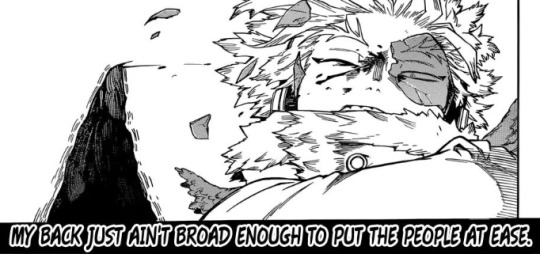

Hawks decision to always sacrifice comes from his own sense of inferiority. He doesn’t feel like he’s enough to save the people he wants to save. The reason he doesn’t try sincerely to save Twice is because he doesn’t think he can. His self worth is so abysmally low. The reason that Hawks doesn’t try to fight back, to try to be a person, to do what he wants which is clearly not to hurt Twice is because Hawks himself has never been in an environment that sees him as a person.
Which is why Dabi gets the upper hand on him. Hawks can make plans, he can act as ruthlessly as possible, but you can’t suppress yourself to the extent that Hawks does. Everything that’s suppressed will eventually come out. If suppression worked, Dabi wouldn’t have half of his body burned off, Twice wouldn’t be split in two, and Himiko wouldn’t have gone crazy with blood lust. What Hawks was suppressing was how much he did not want to hurt Twice in that moment. He wasn’t being true to who he really was, and what he wanted, and as Dabi calls him out for sentiment tripped him up.
What Hawks needs to do is ironically, not learn to be a better hero, but learn to be like Dabi. If he would only allow himself to be true to himself then he would have been able to save Twice in that moment. Hawks, Twice, Dabi, all three of them are good people but the current hero society doesn’t allow them to be good. They all have to learn to fight against society to be the individuals they want to be.
#dabi#hawks#takami keigo#twice#jin bubaigawara#hawks meta#league of villain meta#mha meta#my hero academia meta#lov meta
670 notes
·
View notes
Text
One Episode Left
GoT has one episode left to wrap everything up.
And I have absolute faith that it's going to be satisfactory. [Even if I am *STILL* sobbing over Varys. Gods, I loved Varys.]
No, not everything in this show has been perfect. Torture is ineffective--Ramsay's torture of Theon wouldn't have gotten the reaction it did realistically--and yeah, there's plenty of things that could've been tweaked, adjusted or rewritten. There were incidents that weren't in the books (to my knowledge because we only have five books out atm) that weren't necessary. (Sansa with the Boltons comes to mind.) But there is one thing that I've loved about this show from the beginning.
And it's characterization.
The characterization is solid.
Now EVERYONE is either flipping the fuck out over Dany or doing as I did and pointing out ALL THE WAYS this has been meticulously foreshadowed from the first season. [One solid scene is Dany in the House of the Undying--she walked into the throne room of the Red Keep and the ceiling was open, the pillars were damaged and everything was blanketed in soft white. Which everyone prob thought was snow due to "winter is coming" but it was ash.] Dany was raised on the "divine right of kings" and learned how to conquer. Not rule. CONQUER. And the best we ever saw of her was in season 4 when she admitted to Jorah that she didn't know how to rule, that there was no reason for anyone to accept her as queen and she was gonna damn well stay in Meereen and try to learn.
And why did we see that? Because at that point, everyone who had put an obstacle in Dany's path had been slaughtered. She'd used "fire and blood" to conquer her enemies and all the people left (initially) were hailing her as the Breaker of Chains. That was Dany at her best--when she realized she didn't know how to rule and was going to try to learn.
It fell apart, largely because a) she sent Jorah away (understandable, all things considered) and no longer had him to temper her impulses with counsel and b) because problems arose that she couldn't handle with a single word of High Valyrian.
That was Dany at her best. Her shift hasn't been from good to evil. It's been from conqueror to adored savior and back to conqueror. She's been through Hell, no doubt, and lost almost everything she's ever loved. Dany wasn't taught how to endure loss; she was taught that loss was an offense to her and her birthright, thanks to Viserys spending years talking about their "stolen throne" and their "lost birthright."
Divine right of kings. It's a bitch. [I also think there’s an entire underlying theme that focusing on “reclaiming a birthright” over creating your own god damn life is going to lead straight to Hell in this entire book series.]
No, the "characterization" that I've seen people swear was ruined was Jaime Lannister's. Yes, he should've stayed with Brienne. Yes, he should've cleaved to her and abandoned Cersei. Yes, he really was doing a stupid to run back south and try to reach his sister.
...but you know what? Jaime's been Cersei's other half for his ENTIRE LIFE. He's had the "everyone else is an enemy" pounded into his head by Tywin, just as it was beaten into Cersei (who took it more to heart.) For years, the only person who he thought loved him for himself was Cersei.
And you know, there's this thing where you can love someone who treats you poorly. You can love someone who asks you to do things you don't agree with. You can hope for the love of someone who doesn't love you back (Tyrion was constantly hoping just... just MAYBE Cersei will one day at least see him as family and not an enemy.) Love is complicated, overwhelming and agonizing. [I didn't see anyone complaining about Ygritte peppering Jon Snow's ass with arrows when he chose the Night's Watch over her...] And you can also love two people at once.
Jaime wasn't toying with Brienne. He didn't sleep with her as a joke or to manipulate her. Jaime genuinely loves Brienne. He respects her, is confused and impressed by her honor and sees in her someone that HE could have been if things had been different.
And why would he want to "taint" someone that he respects? Why would he want to linger to damage that honor? Jaime was clear about how he felt when he told her that Cersei was hateful and so was he. It was as close to an explanation that he could give. 'I love you but you are genuinely too good for me and I fear you'll come to regret your choices as I have if I stay.'
He still loved Cersei, even with all that had fallen apart between them, and when it came down to the end, that's what he clung to. Because for that one moment, it WAS just them. That's all that mattered. That they were together at the end. And I can't fault that in the slightest. For season after season, he's been devoted to Cersei, even when she's turned him away or betrayed him. He did what he felt was the best possible choice--leaving Brienne before she could regret him and trying to save Cersei because he still loved her.
As for how their death came about? I loved it.
Not every death is climactic. Not every death is one single character's ongoing story resolution. [Jon didn't need to kill the damn Night King to 'resolve' anything.] Not every single character-specific arc gets a tidy resolution.
And we have a LOT of precedence for this, stretching back to when the books were still guiding the show. Oberyn Martell didn't get his character-specific arc. He didn't get his justice. He got murdered. This is a precedent that has long been established and having people die in a logical manner (i.e. being crushed by collapsing architecture when you're in the lowest point of a building and the supports are giving out) isn't bad writing.
This isn't "sloppy" or "bad" or "idiotic" or any of the other terms I've seen thrown about. The entire point of ASOIAF, translated into Game of Thrones, is that this is NOT A FAIRY TALE. A happy ending is a surprise and a delight in this world, not an expectation. A complete story arc with a triumphant hero is RARE and all the more valuable for when it comes.
I've been rereading the books and rewatching the entire series in preparation for the Final Episode and honestly, the foreshadowing has been meticulous, the character development has been consistent and the characterization has been solid the entire time.
Even Arya turning away from vengeance was solid. She NEVER let go of being Arya Stark; that was one of the biggest issues with her becoming a Faceless Man. She wouldn't give up Needle and she never forgot who she really was, even as she struggled to become "no one." And that person she was trying to hold onto was Arya Stark. Arya Underfoot. The girl who was raised in Winterfell, had a family and had some semblance of hope for life.
Now she had resigned herself to death. She was PREPARED for it when she took out the Night King--which was also foreshadowed--and when she survived? It was confusing as fuck. She couldn't say yes to Gendry because she still hadn't come to terms with the fact that she had lived. That she might KEEP living.
And going to King's Landing was an attempt to hang onto that 'no one.' To work with that decision she had faced and use her existence for some good in the world.
Sandor Clegane had become someone she respected while still reviling. Arya and he clashed multiple times on a morality basis while traveling to the Vale in season 4. For him to tell her that she was on the verge of becoming him was the last straw for her to grasp that using her existence wasn't living and now, maybe... she could take that chance and live and maybe find a little of the Arya Stark she remembered once again.
Characterization: Solid
23 notes
·
View notes
Text
500 Prompts
I’m resurrecting an old chestnut from LJ/DW. Some of the best things I’ve ever written started as prompts from this list. Send me a character or a pairing and let’s see what I can do. (Or several! Multiple prompts are A-OK!)
The vacuum of time.
Terror in the night.
Flashes of euphoria.
Dancing with the devil.
Fatal accident.
Haunting melody.
Black ice.
Breathtaking reality.
Sensation of loss.
Shooting star.
Broken spirit.
Aurora Borealis.
Left behind.
Unguarded touch.
Last time.
Dying sun.
Devastating explosion.
Alone in a crowd.
Fragmented truths.
Gaping chasm.
Arise from the ashes.
The end of the beginning.
Remember me.
Flash of lightning.
Emergency evacuation.
Immortal laughter.
A whisper on the wind.
Electrifying sacrifice.
The calm before the storm.
A life of lies.
The winds of change.
The hand of fate.
Desperate plea.
Nightmare.
Whitewashed walls.
Caught in the act.
Wake up, the day is dying.
Close your eyes.
Beyond the horizon.
Finality.
Releasing the sparrow.
Something's out there.
Golden miracle.
I covet you.
The eye of the storm.
Screaming silence.
Her body was found...
I used to remember you.
Gasping confession.
Betrayal.
Uncontrollable wrath.
Dragon of shadow.
Natural disaster.
Leap of faith.
Faceless and nameless.
Harsh revelation.
A path to follow.
The power of goodbye.
Through a child's eyes.
One final look back.
Crumbling heart.
Ignored instinct.
Seductive danger.
Jumbled truths.
Shallow grave.
Why they call it falling.
Volcano.
Dying land.
A child's truth.
Antiseptic air.
Chained to mortality.
Dim as an ember.
Acid tears.
Unexpected emptiness.
Miraculous relief.
Letting go.
What Earth once was.
Frantic search.
Tragic moment.
Beneath the smiles.
Across the worlds.
In the still of the night.
Counting years.
Kidnapped innocence.
Tears of desire.
Ring of sunlight.
Trembling cold.
Missing planet.
Suffering rain.
Parched ego.
Toxic tease.
Horrific distortion.
Miracle ruin.
Wailing shadows.
Barren abyss.
Ravenous time.
Approaching doom.
Eternal danger.
Vacant arch.
Recoil.
Vehement grace.
Urban legend.
Gentle warmth.
Rippling tide.
Fallen haze.
That's all I ask of you.
Think of me.
Promise me.
A white rose.
Never let go.
Ghost of a rose.
Fire.
Enchanting surrender.
Cowering sunrise.
Deliverance.
Resisting temptation.
Leaves of amber.
I remember when she loved me.
Heart of a child.
Don't scream.
Bereft confusion.
Mysterious stranger.
Subconscious reality.
The truth about forever.
She's burning up.
You were supposed to be watching her!
Lost soul.
Wandering spirit.
Touched by an angel.
Shattered reflections.
Central power.
Lightning fast refusal.
Don't you dare.
Emerald eternity.
There will always be a monster.
Infinite embrace.
It's too late.
Cabin by the sea.
Guardian.
Amusingly inconsequential.
Ignited illusion.
Forsaken stealth.
Corrupted intrigue.
Kindle my soul.
Majestic memories.
Breathe, baby, breathe!
Resonating hunger.
Relinquished radiance.
Transcendent joy.
Silent watcher.
Her eyes believed in mysteries.
Last breath.
Sweet nothings.
Unfinished tale.
Endless darkness.
Suffocating darkness.
Passing warrior.
Shield maiden.
Old oak.
Ancient willow.
Off the map.
Deserted riverbank.
I never thought...
A walk along the shore.
The valley of echoes.
The family nobody wanted.
Dancing in the fountain.
Laughter from the flames.
A time for tenderness.
Sleeping storm.
Islands in the sky.
Unheeded warning.
Voices in his/her/my mind...
Spellbound.
It wasn't his/her/my/your fault...
Tempting enigma.
His/her/my/your compassion is like a shadow...
Even he/she/I have forgotten his/her/my name...
I hate love.
Irresistible coercion.
I offer no excuses...
Tumbling clouds.
Blue mists.
You think you have it bad?
His/her/my pain was like a desert...
Nothing could bleed that much.
Nothing lost, nothing gained.
Delicious tragedy.
The in between.
Into the river.
You're/He's/She's/I'm/They're only sleeping.
What can you see?
They're calling me/you/he/she/them home.
The end.
Somewhere out there.
Lamentation.
The moment…
Suddenly…
Childhood's end.
Broken weapon.
Gazing upon the sky with dampened eyes...
Vast horizons.
Entrapment.
Quaking need.
Memory of a dream.
Dangerous illusion.
Firestarter.
Enraged superstition.
Guilty morals.
Fragile as a dream.
An eye for an eye, a tooth for a tooth.
Portals of discovery.
Fall from grace.
Balance of power.
Out of sight, out of mind.
Diamond in the rough.
The essence of life.
Nostalgic numbness.
Desire, ask, believe, receive.
A fate worse than death.
The razor's edge.
Reach for the stars.
Touch me.
Unrequited accusation.
Tragic shadow.
Forbidden laughter.
Starved for affection.
Between a rock and a hard place.
No man is an island.
Critical vengeance.
Rough hands.
Mystery.
After tonight.
Farewell.
And the edges blur.
One thousand promises.
A broken sensitivity.
A curling shadow.
A darker pride.
A deluge of dancers.
A fallacy in your head.
A four leaf clover.
A golden shield.
A love remembered.
A lustful lie.
A magical time.
A perfect rainbow in Hell.
A queer sort of clockwork.
A secondhand heart.
A story never to tell.
All sorts of complicated.
All the tears of God.
Alone I break.
And that's when I stopped believing in gravity.
No one mourns the wicked.
Die alone.
Asleep at dawn.
Assassin for hire.
Based on a dream.
Once upon a December.
Before the next tear falls.
The beginning of goodbye.
A lonely tomorrow.
Beneath the blue.
Better left unsaid.
Between a rock and your mother.
Beyond the galaxy's walls.
Birthing black and white.
Blood and moon.
Blood wars.
Bribing the Devil.
Broken promises and broken hearts.
False gold.
By midnight's favor.
By the light of a million stars.
Castles in the sky.
Catastrophe in the making.
Crawling nightmare.
Crimson orchid.
Crown of ivy.
Call of the wild.
Darkness becomes me.
Dawn of night.
Dawning upon a crimson ruin.
Death becomes you.
Demon tongue.
Desolation row.
Destined jealousy.
Burning star.
Do you remember the end?
Don't look into its eyes.
Dragons in your eyes.
Make a wish and toss a penny to the moon.
Ecstatic pain.
Edge of sanity.
Elemental rain.
Equinox rising.
Ethereal blood.
Evening shadows.
Exquisite and unforgivable.
Face down I cry.
Fallen fae.
Light step.
Faery-eyed child.
Fail with honour.
A childhood dream.
Fields of dust.
Final breath.
Finding infinity.
Flame in the twilight.
For the child I will sing.
Foreign serenade.
Lost beginning.
Forgotten, not forgiven.
Fractured reality.
Fragile hearts and candy-coated dreams.
Angels among us.
Haunting lonely pools.
Portrait in black.
Approaching Flood.
Technological reality.
I am the night you die.
I believe in God. I can hear him laughing at me.
I appeared here to vanish there.
I close my eyes and you disappear.
I loved you mommy, the day I killed you.
I miss who you were...
I thought you were alive.
I was here two days from now.
I wish upon tonight.
I write sins, not tragedies.
If looks could kill...
Illuminated darkness.
Death by imagination.
Pierce the sky.
Unfathomable truth.
Shackles of the mind.
Growing fonder.
A time to grieve.
Fire in your eyes.
Tales of long ago.
Live on your toes, love on your knees, die on your feet.
Prisoner in her mind.
Hold still, I'm trying to kill you.
Breath of the devil.
The innocent can never last.
Too wide to cross.
Arrogance and beauty, painted in ugliness...
Falseness in acquaintance.
Beneath the shade of the Sycamore...
One summer's/autumn's/winter's/spring's eve.
In the shadow of Mount Gloom.
Intoxicating the mind.
Island of light.
It ends tonight.
Jilted dreams.
Night of fire.
Knowledge in death, wisdom in immortality.
Liberating release.
Life on white wings.
A beacon of hope.
Like shattered glass.
Listless winter.
Little girl's downfall.
Lonely by candlelight.
Silent angels.
Gazing out a broken window.
You cannot lose what you never had.
Blood and tears.
Love's pretty follies.
The gift of lucidity.
Mint and lilac.
Missing Heaven and roses.
Mother Earth's last stand.
How do I/we/you say goodbye?
Where does the sky end?
Breathtaking innocence.
Dangerous stranger.
Lost in dreams.
Found in reality.
Forgotten sanctuary.
Treacherous deceit.
Warped.
Disenchanted crystal.
Laughing at the moon.
Yesterday's tomorrow.
Future of the past.
Supernova.
Whispers in the dark.
Letters from nowhere.
The one no one sees.
Beautiful disaster.
Passionate desires.
Remnants of darkness.
The bitterness of mortality.
An exquisite extreme unknown.
More Heaven than a heart could hold.
Flames of disaster.
Miraculous discovery.
Trusting in a soul.
Twilight surrender.
When love turns to hate.
Lost and alone.
When the river runs dry.
Lapping at the shores of sleep.
Landing among the stars.
Reaching for the moon.
When stillness descends.
On the brink of forever.
Clinging to the edge of control.
Abandoned resistance.
Eyes within the Heart.
Heart within the eyes.
When forever fades away.
Grave acceptance.
Flying amidst a rainbow.
Falling from a cloud.
Alone with forever.
Sunrise upon a soul.
Prisms of a fragmented whole.
A glittering cavern.
Disembodied voices.
Dancing beneath the moon.
Dancing on the water.
Gliding over glass.
A tale rewritten.
Exiled child.
Letters and vowels, spinning and tiles.
I'll try violence.
Who named the stars?
Mysterious beyond.
Ocean tears.
Sleepy death.
Sea bed.
Whispering nightmare.
Bound by silence.
A twinkle in the night.
A waking slumber.
See no evil, hear no evil, speak no evil.
My lips are sealed.
Sometimes it is better not to follow your own destiny.
An invitation to Heaven.
Attacked by a dream.
Caressed by a nightmare.
The ravages of time.
Ancient tale.
Faces in the clouds.
Ripped apart.
The end of something better - The beginning of something worse.
The space between.
Look beyond.
Edge of the knife.
A human voice.
Dream the impossible.
Forgotten roads.
Flowers in the ashes.
A bitter pill.
Another fine mess.
The life inside.
Still crossroads.
Frozen bridges.
Fear of the fall.
Illusions of the darkness.
Sacrificial tension.
Path of a child.
Imitation of life.
Behind the mirror.
Through the fire.
Echoes of bondage.
Freedom in chains.
Parting regrets.
Something unheard of.
Hidden tales.
Laughter of the ages.
Frozen fire.
White shores.
Lights out.
Liquid sunset.
Silver glass.
When words fail.
A death of a thousand screams.
Those who do not remember the past.
When laughter's lost in peaceful silence.
The sands of time.
When death's lips left mine.
Cataclysm.
When Earth dies.
When worlds collide.
A mortal's forever.
Flight of disaster.
When tomorrows run out.
Kisses of a night terror.
Dashed against a rock.
Invisible defender.
The tattered, the torn.
A little happiness.
London by gaslight.
He sees the map back to her in the scars of his hands.
She never really leaves him...
And the thunder rolls.
#i have a prompt problem#prompt meeeeee#fan fiction#i love this prompt list so much y'all#make me happy#y'all know my fandoms#space vikings#valki#frostshield#crimson peak#star trek discovery#mfmm#prompt list
42 notes
·
View notes
Link
Related News
Asmeena, the wife of Rakbar Khan, who was beaten to death on the suspicion of cow smuggling, tends to a cow. (Photos: Amit Madheshiya)
Their first film, on the now-obscure travelling cinemas of Maharashtra, debuted as an official selection at Cannes in 2017 and won awards at several major festivals. In the years since, documentary filmmaker duo Shirley Abraham and Amit Madheshiya have trained their focus on the fault lines of contemporary India. Their short documentary, Searching for Saraswati, released via The New York Times last year, explored how ancient myths are being used to push the idea
Related News
Asmeena, the wife of Rakbar Khan, who was beaten to death on the suspicion of cow smuggling, tends to a cow. (Photos: Amit Madheshiya)
Their first film, on the now-obscure travelling cinemas of Maharashtra, debuted as an official selection at Cannes in 2017 and won awards at several major festivals. In the years since, documentary filmmaker duo Shirley Abraham and Amit Madheshiya have trained their focus on the fault lines of contemporary India. Their short documentary, Searching for Saraswati, released via The New York Times last year, explored how ancient myths are being used to push the idea of hypernationalism. Their latest project, titled The Hour of Lynching (18 minutes long), looks at how “viral videos” are being used to perpetuate hate towards minorities. It is the first documentary from India to receive a Pulitzer grant, and will be released in the US and in the UK (through The Guardian) later this month. In this interview, they talk about the power of imagery, the idea of justice and the ecosystem of lynchings. Excerpts:
Why do you think there is an international interest in the lynchings in India?
Shirley Abraham (SA): I’d say it’s the continuity of history. The American South has had a traumatic history, where 4,400 such documented incidents took place between 1877 and 1950.
Amit Madheshiya (AM): This sort of primordial violence happening in contemporary India is the first degree of shock for anyone. Around 49 people have been lynched to death since 2014, yet it’s not an election issue. Today, the US has a museum of lynchings where they memorialise those incidents, acknowledging that they, as a people, came to a point where they thought it was okay to carry out such gruesome violence. But here what we have is silence.
In the US, the memorialising came 70 years later. Do you think India needs time to reflect as well?
AM: The template exists in the form of American racial history. We have to learn not to do this again. That is why history exists, so that we can learn.
Did you decide to document the lynchings because of the silence?
AM: Mob lynchings are a kind of spectacle that asks for an audience. A theatre that happens in public. The ones participating in it believe they have to send out a message — both to the minority and the majority. To the former, they say, ‘You are unwelcome here and there is no rule of law to protect.’ To the majority, ‘This is what we can do.’ This idea is encouraged when we do not condemn it and choose to remain silent.
Best Of Express
Since I am a photographer, I go back to Roland Barthes’s landmark essay (The Photographic Message), where he says a photograph does transmit a code that this event happened in a specific moment at a specific time. But moving images, which we gruesomely refer to as viral videos, convey the message that the same incident can be made to happen again. They are meant to goad the majority. In this theatre, one doesn’t applaud by clapping but by keeping quiet. We, as documentary filmmakers, had to break the fourth wall and condemn the act.
Shirley Abraham and Amit Madheshiya (Photos: Amit Madheshiya)
Is that why you chose the medium of the moving image?
AM: Our film is a critique and comment on the lynchings. In the American South, professional photographers were invited to take pictures of white men along with their victims hung from trees or set to fire. The photographs were souvenirs for rich white men. Today, people perpetrating the violence in India are taking their own images. It comes with a great sense of impunity that nothing will happen to us. They believe they have to create this spectacle for it to be recreated elsewhere. The film is also a critique of how we all own these videos today and, in the process, become complicit to the crime.
SA: I was interested in the idea of justice. The mobs believe they are above the law. In this way, they find a sense of justice for themselves. But when we met the families of the victims, we realised they, too, were seeking videos of their loved ones as a way to validate their grief or accept that such an incident happened. Asmeena, the wife one of the victims Rakbar Khan, who was lynched in July 2018 in Alwar, says she wished everybody could see the perpetrators the way they were consuming her pictures on news media. She came to a point of acceptance that even if the perpetrators continue to live with impunity, there will be some form of justice if they do not remain faceless.
More Explained
Why did you choose the short documentary medium to tell a story with so many facets?
AM: The perpetuation of this spectacle happens online through WhatsApp groups and social media. It is the ecosystem the virus is infesting, so we wanted to inject an antibody within the same system. The internet is the best medium for a film on viral videos.
If the lynchings are a part of a larger ecosystem that directs hate at the minorities, why did you focus only on the killings?
SA: We found the lynchings a good way of looking at our moral compass. Take, for instance, the case of Mohammad Akhlaq. The narrative after his lynching was skewed. When the system spoke about a slaughter, it was the slaughter of the imagined cow, and not the man. It was the food in his fridge that was sent for forensic testing. When talking of the accused, people spoke of the man who was lynched and not the people who committed the gruesome act. There was a complete inversion of what we know as right and wrong.
It’s a crime, yes, but what happens when such orgiastic violence is injected into the bloodstream of a society? One thing is we develop a very high level of tolerance for violence.
AM: It’s also why we chose to work with one family (Rakbar Khan’s). The grief is lost in statistics. While important, they don’t illuminate the human experience. How is the family coping? Has it disintegrated? These were some of the questions we wanted to explore.
SA: I believe we were able to evoke an essence of that larger ecosystem through this film. We see children as young as 10, being given weapons training, which means they are being trained by a militaristic society.
How much did you find the government to be responsible?
SA: The Prime Minister spoke up only once after the first reported instance of lynchings. His, and his ministers’ silence, is an enabler in such a case. In an essay, James Baldwin says mobs are not autonomous…they execute the real will of the state even though they are faceless. There are FIRs being filed against “unknown persons”. Who are these? Who is outsourcing this to the mobs with impunity? That is something that remains known and hidden at the same time.
AM: Many perpetrators have been rewarded publicly. For instance, BJP[1] Union minister Jayant Sinha[2] garlanded an accused in Jharkhand.
This article appeared in print with the headline ‘The Ones Who Got Away’
References
^BJP (indianexpress.com)
^Jayant Sinha (indianexpress.com)
PAGE 2
1 note
·
View note